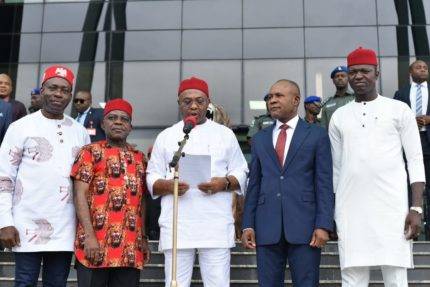In a bid to address critical regional concerns, governors from Nigeria’s southeastern states are planning a significant meeting with President Bola Ahmed Tinubu. The primary agenda is to discuss the potential release of Nnamdi Kanu, the leader of the Indigenous People of Biafra (IPOB), whose detention has been a point of contention and unrest in the region. This decision was disclosed by Governor Hope Uzodinma of Imo State, who also serves as the chairman of the Southeastern Governors’ Forum, following a crucial gathering in Enugu.
Governor Uzodinma emphasized the collective resolve of the southeastern governors to engage with the federal government on this sensitive issue. The release of Kanu is seen as a pivotal step towards restoring peace and stability in the region, which has witnessed significant unrest and economic disruptions linked to IPOB activities. The governors believe that a high-level dialogue with President Tinubu could pave the way for a peaceful resolution and foster greater understanding and cooperation between the southeastern states and the federal government.
Governors Gather in Enugu: Key Resolutions and Solidarity Visits
The meeting in Enugu was attended by all five governors from the southeastern states, including Hope Uzodinma (Imo), Alex Otti (Abia), Chukwuma Soludo (Anambra), Francis Nwifuru (Ebonyi), and Peter Mbah (Enugu). During this assembly, the governors reached several important resolutions aimed at addressing both immediate and long-term challenges facing the region. Among these was a resolution to implement aspects of the South-East Security and Economic Summit report, focusing on enhancing regional security and economic integration.
Additionally, the forum expressed condolences to the families and governments affected by the recent passing of Dr. Ogbonnaya Onu, a prominent figure from the region. This show of solidarity underscores the forum’s commitment to unity and mutual support amidst the region’s ongoing challenges. The presence of notable figures such as former President Olusegun Obasanjo, Chief Emeka Anyaoku, and His Royal Majesty Igwe Nnaemeka Achebe, who visited to show their support, further highlighted the significance of the meeting.
Strategic Plans and Future Engagements
Beyond discussing Nnamdi Kanu’s release, the southeastern governors also deliberated on broader strategic initiatives aimed at bolstering regional development. The reviewed report from the South-East Security and Economic Summit held in Owerri last September served as a critical framework for these discussions. The governors agreed to implement actionable plans derived from the summit, particularly those addressing security and economic growth, which are seen as vital for the region’s progress.
In their resolve to visit President Tinubu, the governors aim to present a unified front on pressing regional issues. This forthcoming engagement with the President is anticipated to cover a range of topics, including enhanced security measures, economic development programs, and improved federal support for southeastern states. The collective action of the governors underscores their commitment to driving positive change and ensuring the well-being of their constituents through strategic dialogue and collaboration with the federal government.
Southeastern Governors’ Strategy: Masterstroke for Security Challenges
The release of Nnamdi Kanu, the leader of the Indigenous People of Biafra (IPOB), is seen as a masterstroke by the southeastern governors to address the longstanding security challenges in the region. The decision to free Kanu is seen as a significant political maneuver aimed at restoring peace and stability. For years, the Southeast has grappled with insecurity, affecting both the social fabric and economic development of the region. By taking this bold step, the governors hope to not only alleviate the immediate security concerns but also create a conducive environment for sustainable development.
This political approach is welcomed by many stakeholders, who believe that a peaceful and stable Southeast is crucial for the economic revival of the area. The region, rich in resources and entrepreneurial talent, has the potential to become a hub of economic activity. However, insecurity has deterred investment and stunted growth. The release of Kanu is expected to foster a sense of reconciliation and inclusiveness, paving the way for renewed economic opportunities. As peace returns, local businesses can thrive, and new investments can flow into the region, spurring development and prosperity.
Conditional Release: A Balanced Approach for Lasting Peace
While the move to release Nnamdi Kanu is generally seen as positive, some political pundits argue that it should come with specific conditions to ensure lasting peace. They suggest that before Kanu’s unconditional release, IPOB and its armed wing, the Eastern Security Network (ESN), should surrender to the military and relinquish all arms and ammunition. This step is viewed as crucial to dismantling the militant infrastructure that has contributed to the region’s instability.
Ensuring the surrender of IPOB and ESN would demonstrate a commitment to peace and set a precedent for resolving conflicts through dialogue rather than violence. It would also reassure the federal government and the international community that the Southeast is committed to maintaining law and order. By meeting these conditions, the region can move towards a more stable and secure future, benefiting from both peace and economic resurgence. Ultimately, a conditional release of Kanu, tied to the disarmament of militant groups, could be the key to achieving enduring peace and prosperity in the Southeast.
Table of Contents
Discover more from OGM News NG
Subscribe to get the latest posts sent to your email.














